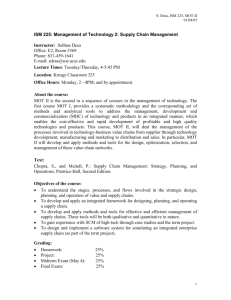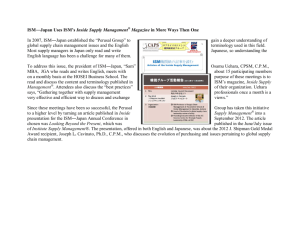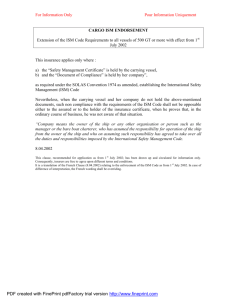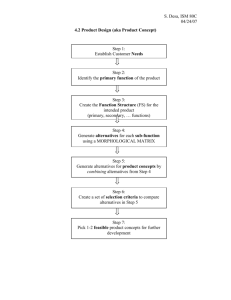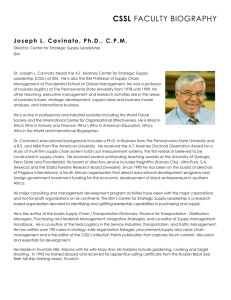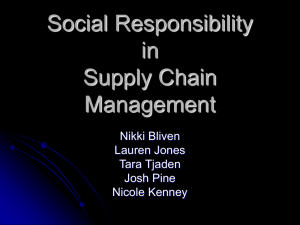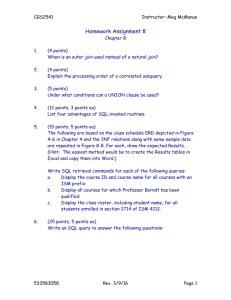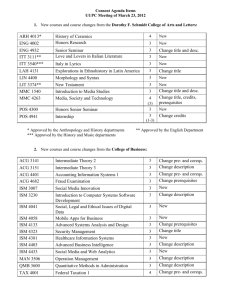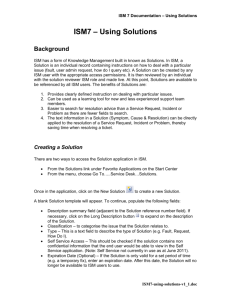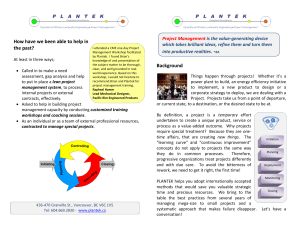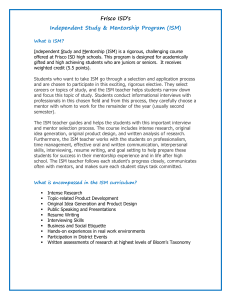ISM 125/225: Management of Technology II: Supply
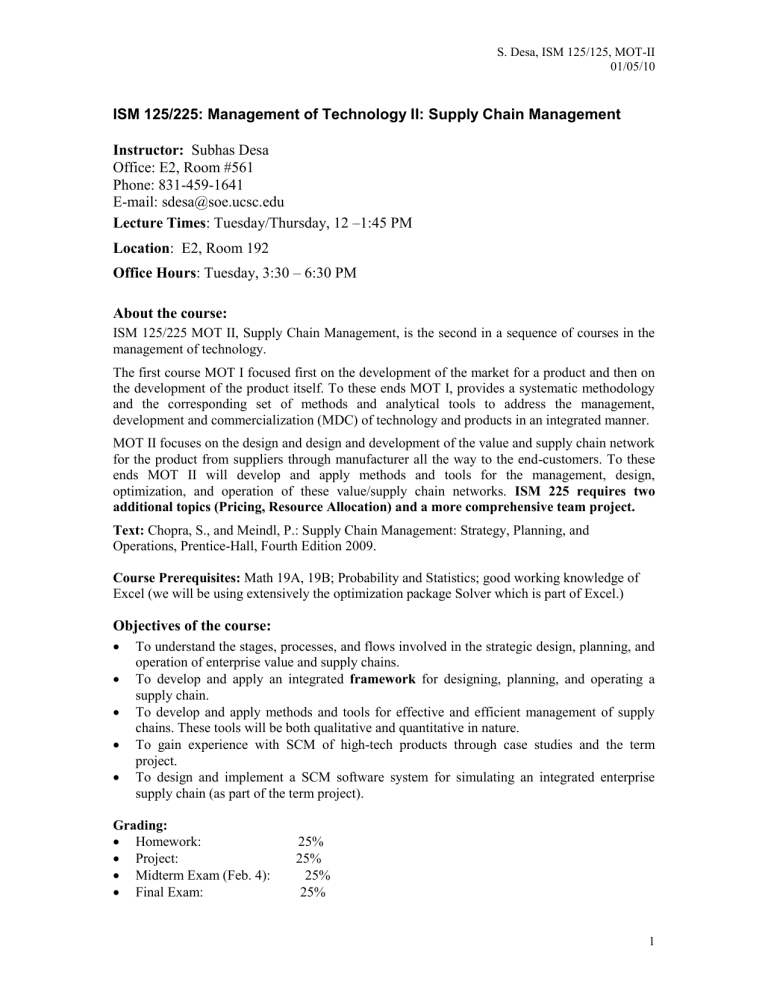
S. Desa, ISM 125/125, MOT-II
01/05/10
ISM 125/225: Management of Technology II: Supply Chain Management
Instructor:
Subhas Desa
Office: E2, Room #561
Phone: 831-459-1641
E-mail: sdesa@soe.ucsc.edu
Lecture Times
: Tuesday/Thursday, 12 –1:45 PM
Location
: E2, Room 192
Office Hours
: Tuesday, 3:30 – 6:30 PM
About the course:
ISM 125/225 MOT II, Supply Chain Management, is the second in a sequence of courses in the management of technology.
The first course MOT I focused first on the development of the market for a product and then on the development of the product itself. To these ends MOT I, provides a systematic methodology and the corresponding set of methods and analytical tools to address the management, development and commercialization (MDC) of technology and products in an integrated manner.
MOT II focuses on the design and design and development of the value and supply chain network for the product from suppliers through manufacturer all the way to the end-customers. To these ends MOT II will develop and apply methods and tools for the management, design, optimization, and operation of these value/supply chain networks. ISM 225 requires two additional topics (Pricing, Resource Allocation) and a more comprehensive team project.
Text: Chopra, S., and Meindl, P.: Supply Chain Management: Strategy, Planning, and
Operations, Prentice-Hall, Fourth Edition 2009.
Course Prerequisites: Math 19A, 19B; Probability and Statistics; good working knowledge of
Excel (we will be using extensively the optimization package Solver which is part of Excel.)
Objectives of the course:
To understand the stages, processes, and flows involved in the strategic design, planning, and operation of enterprise value and supply chains.
To develop and apply an integrated framework for designing, planning, and operating a supply chain.
To develop and apply methods and tools for effective and efficient management of supply chains. These tools will be both qualitative and quantitative in nature.
To gain experience with SCM of high-tech products through case studies and the term project.
To design and implement a SCM software system for simulating an integrated enterprise supply chain (as part of the term project).
Grading:
Homework: 25%
Project: 25%
Midterm Exam (Feb. 4): 25%
Final Exam: 25%
1
S. Desa, ISM 125/125, MOT-II
01/05/10
Project Plan:
(dates indicate when progress reports are due)
Form project teams and choose technology domain by 1/7
Formulate Project Proposal: due 1/12
Phase 1 (Technology/Product Strategy and SC Strategy/Design): due 1/19
Phase 2 (Supply Chain modeling and planning; demand forecasting): due 2/2
Phase 3 (Supply Chain operations: inventory, transportation, and facilities): due 2/16
Phase 4 (The software information system for the Supply Chain; simulation) due 3/2
Phase 5: Closure and Final Report: due 3/9
General Comments:
This course is interactive. We will be actively discussing case studies and homework in class . Therefore, attendance is mandatory .
Homework must be turned in on time. This is really to prevent the “bullwhip effect” (see chapter in the textbook on “Coordination”, and also the section on the “Beer Game”)
If you have any problems related to the course, please inform me immediately so that we can resolve the issue quickly.
Course Topics (D/S = Design/Strategy; P = Planning; O= Operations):
Methodology/Tools Topic
Introduction to SCM Stages, Cycles, Flows, IT
Examples or Case
Study
Dell, Toyota
Text
Chapter*
1,
16.1, 16.2
2,
3,
17.1-17.3
7
D/S 1: Supply Chain
Performance and Drivers
P1: Demand Forecasting in a SC
Strategic fit between competitive strategy and
Supply Chain strategy
P2: Managing economies of scale in an SC
Cycle Inventory control
P3: Managing Uncertainty Safety Inventory control
P4: Optimal Product
Availability
P5, O1: Transportation
Time Series Forecasting methods
Optimization
Transportation Network
Design
D/S 2: Supply Chain
Network and Facilities
Mixed Integer and Linear
Programming
Design
D/S 3: Sourcing Supplier
Assessment/Scoring
O2: Coordination in a SC “Bullwhip Effect”
D/S 4: Information Tech.
D/S 5: (ISM 225 only)
Pricing
IT Architecture
Optimization
Dell, Toyota
Specialty Packaging
Corporation (SPC)
Moonchem, Dell,
Toyota
ALKO, Inc.
Walmart,
SportStuff.com
Beer Game
SAP
P6: (ISM 225 only)
Aggregate Planning
Linear Programming SPC, Kodak
*(Chapter Numbers refer to the Third Edition [2007] of the textbook)
10
11
12.1-12.3
13
4,5
14
17
16
15
8, 9
2
